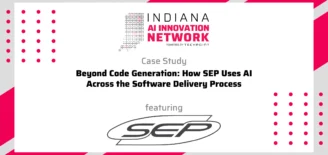A front row seat to emerging Indiana entertainment tech companies
The unprecedented events of 2020 revealed gaps in consumer services and infrastructure that were either unknown or under-appreciated until the pandemic forced them to the fore.
For example, grocery delivery and pick-up company Instacart seemed like a solution in search of a problem that was losing $25 million a month prior to the pandemic. In April 2020, however, stay-at-home orders drove the company to its first monthly profit. Instacart has since surpassed its 2022 corporate goals a year early and hired 350,000 new employees.
Feeding the soul is just as important as feeding the body, some might argue, and the arts suffered from nearly a full stoppage when the pandemic first hit. Enterprising entrepreneurs at two Hoosier startups—Mandolin and Stagetime—identified these gaps in the music performance and music business markets and used creative innovations to fill them.
Entertainment technology is a fairly new facet of the tech ecosystem, and it was already gaining traction before the pandemic. Success in this sector requires innovation in everything from virtual experiences, enhancing in-person events, engineering for human-computer interactions, media systems design, game design, and more. Essentially, entertainment tech is the study of how technology can be used to enhance the way we experience entertainment.
Many performers, especially live musicians, comedians, or spoken word artists, were forced to pivot in 2020, since in-person experiences weren’t available. While virtual experiences were starting to become available before the pandemic, many apps and platforms typically used for live streaming weren’t fully prepared for the amount of performers who wanted to use their platforms or for the amount of users who wanted to watch virtually. On the flip side, many people wanted a better way to experience all of the media they were consuming at home.
As a result of the pandemic and the increased demand for entertainment, Indiana saw entertainment tech companies emerge that solved these entertainment challenges as well as created better “mousetraps” for existing experiences. A new platform was created by Indianapolis-based Mandolin to help curate a front-row seat experience for at-home audiences while also offering opportunities to performers. Bloomington-based Stagetime developed a professional networking site for the performing arts industry.
Not just a digital channel, redefining live entertainment altogether
Specializing in producing live music shows, Mandolin quickly pivoted at the onset of COVID-19 to develop a digital platform designed to help artists, venues, and fans connect through live music. On a mission to “redefine live entertainment,” Mandolin offers unique live streaming experiences that make you feel like you’re in the middle of the action, even if you’re halfway around the world. In a short period of time, Mandolin was producing live streamed shows and giving artists the opportunity to engage with their fans at home.
Backed by VCs including High Alpha, Mandolin created a platform that seamlessly allows artists to perform and viewers to watch, but they also managed to integrate special touches to make the at-home experience unique and more intimate. For example, they added an option for fans to leave messages and song requests in a chat feature, which created a real-time dialogue between artists and the audience. Another unique touch was the ability for artists to upsell their experiences with merchandise and other concert upgrades, which entices more people to purchase tickets. In fact, 57% of Ruston Kelly’s show revenue came from complementary virtual upgrades, including a VIP experience and merch bundles. He also increased ticket sales by 470% during COVID using Mandolin, which created more demand for his music.
Mary Kay Huse, Mandolin’s co-founder and CEO, expects livestreaming to be mainstream moving forward. Yes, live music will be coming back in a major way, but having the ability to sell online tickets as well as upgrades gives artists the ability to reach a fanbase many musicians may not have explored previously. In an interview with Pollstar, Huse noted, “We are reaching fans that weren’t targets before. Maybe they will now want to go to a show, so it’s been a fan acquisition tool. Or maybe they will always just be livestream fans, and that’s a completely incremental fanbase that didn’t exist before.”
Making your digital profile sing (so to speak)
Another Hoosier entertainment tech company that emerged in 2020 was Stagetime, the professional network for the performing arts industry. Supported by the IU Angel Network and the Flywheel Fund, Stagetime was created by IU graduate Jennie Moser to provide an online platform for performers to search and apply for jobs virtually.
As an opera singer, Jennie saw firsthand how tedious and difficult the process was for performers, and she wanted to create a way for performers to find opportunities as well as market themselves. Moser reported in an interview with IU that “performers apply for up to 50 jobs per year, often booking them years in advance.”
“Performers cannot adequately portray their level of talent on a piece of paper or in an online job description,” Moser said in the interview with IU, originally reported by Samantha Ginther of IU Ventures. “Stagetime helps them consolidate the myriad disjointed tools they currently use to display their talents, grow their networks and advance their careers, which currently includes all major social media platforms, personal websites and professional CVs.”
While Mandolin caters to the performance piece, Stagetime is a tool to help dedicated performers and professionals find opportunities for careers and jobs. Another added feature of the Stagetime platform is the visible networking opportunities. Not only can users incorporate previous collaborators into their profile, but they can showcase a timeline of experience and referrals.
Made for working performers, artists, or musicians, Stagetime helps entertainers put their best foot forward with personal branding and a professional profile. With Stagetime, the performer chooses how they want to represent their talents in a way to attract opportunities they want. It’s no longer a waiting game; this tool empowers artists to explore opportunities to which they may never have been exposed previously.
Putting Indiana on the map for another tech innovation category
Mandolin and Stagetime are just a couple of examples of the ways entertainment tech is changing the entertainment industry. Both companies are seeing incredible growth and opportunity because of their creative, innovative ways at approaching challenges currently faced by performers. What’s even more exciting is the fact that these technologies are empowering artists like never before, providing opportunities for them to find, create, and monetize the experiences they envision.
As the industry continues to grow and adapt, we’ll be curious to see how entertainment tech will continue to emerge in Indiana. How will new entertainment technologies change our experiences? Will the live performance industry ever be quite like it once was, or will most continue to enjoy experiences from the comfort of their own homes? Does this mean your favorite local band is going to get famous a lot faster with these technologies? Only time will tell, and we’re excited to have a front-row seat.




